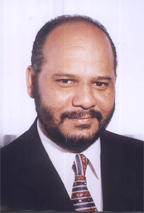Minister of Home Affairs Clement Rohee led Guyana’s team, while Justice Minister Chandrikapersad Santoki led Suriname’s team at the Pegasus Hotel engagement.
Minister Rohee said in opening remarks that meeting is, among other things, aimed at “thwarting would-be criminals from taking advantage of our separate jurisdictions, bringing to justice those engaged in cross-boundary criminal and other illegal enterprises and engendering a general atmosphere of peace and security in out two societies.”
Yesterday’s meeting, which is a follow-up to a similar one that was held in Suriname in May of 2008 that resulted in the Declaration of Nieuw Nickerie, was last week Friday described by Minister Rohee as one of the ways Guyana is fighting the scourge of drug trafficking.
Minister Santoki sees the bilateral talks as an important means of combatting cross-border and other crimes that threaten the security of the two nations and the rule of law. He underscored the fact that transnational organised crimes are considered a huge threat to the economy, social and political development in society.

Tangible testimony
According to Rohee, the one-day engagement is tangible testimony to the strong commitment made by the two countries as they collaborate in combatting crime in all of its facets, whether it is in relation to the drug trade; the smuggling of goods, illegal trade in small arms or the apprehension of those who flee criminal justice in either state.
The minister said that since Guyana is “striving to make all of its communities” safer it is necessary to promote closer cooperation with all of its neighbours to address the various law enforcement issues that confront it.
“In an era in which criminals and which criminal organisations are joining forces in pursuit of their illegitimate aspirations, it is indispensable that neighbouring states combine their intelligence and law enforcement capabilities if criminality is to be successfully defeated,” the minister said.
He said the two countries must continue to find means of jointly meeting the challenges posed by criminal operatives as criminality is one of the “key impediments to growth and development.” The minister said both countries must enhance their cooperation in terms of policy initiatives and development when it comes to issues related to crime and security.
Rohee mentioned that both countries are party to the Inter-American Convention on Mutual Assistance in Criminal Matters pointing out that it is imperative that the convention be looked at not only in terms of what it helps the countries to cooperate on within the OAS, “but how Guyana and Suriname can adapt it to meet our own peculiar needs as neighbouring states.”
Bilateral assistance
Meanwhile, Santoki stressed that combatting and eliminating the various kinds of threats of organised crimes cannot be done by one country but rather with bilateral assistance among sister nations.
“These threats cannot be tackled in isolation since most of them are interrelated and have transnational… character. And these characters and developments are constantly changing the landscape of the international security in which new threats are emerging… [There is] a new transhipment method of drugs, the introduction of new types of drugs and also the sophisticated illegal transhipment and smuggling of firearms,” the Suriname justice minister said.
He said such developments are seriously affecting global security and are having an impact on all nations.
“It is of great importance for us as neighbouring countries to cooperate equitably in order to combat and minimise these threats,” the minister said.
However, he pointed out that each country also has its own responsibility and sovereignty to take action to protect its citizens and communities to eliminate common threats and increase common security.
“We have no other choice we have to cooperate effectively against the international, hemispheric and the regional threats. We have to fight the common threats and we have to assist each other in the fight against the local threats which don’t have any borders, which [do] not respect any law… [And] which affects border security,” Santoki said.
“…We have a strong political willingness as two nations for strong cooperation… We have a joint strategy. We have a strong commitment to enhance the cooperation and security and nothing, let me express this clearly, and nothing, no crime, no criminals and no other issue will divide us in this approach which is beneficial to both nations and both communities,” Santoki stressed.
And Santoki later told the media that on a regular basis there is exchange of information between the two countries about wanted persons; often wanted persons in Guyana find their way to Suriname, which has led to the arrest and expulsion of those persons from his country.
Santoki had played a major role in drug kingpin Roger Khan being arrested in Suriname from where he was later deported via Trinidad where he was nabbed by US authorities. He said it is the path that has to be taken as it is fundamental that intelligence information be shared confidentially to maintain proper cooperation between the two nations.
“I am very pleased to say that there was some positive development in certain areas of cooperation; that there is a better understanding [between] the law enforcement and intelligence officials of both nations. But more important that the two governments, on a high level, are cooperating,” the minister said.
Rohee said the 2008 declaration was a result of the two countries’ decision to cooperate more fully to combat common challenges associated with crime and security. He said a mechanism was established in 2008 to facilitate enhanced security cooperation and coordination between the two countries. He described the mechanism as being born out of the realisation that Guyana and Suriname were separate legal jurisdictions and criminals and would-be criminals would seek to take advantage of that fact to escape punishment for their crimes and to maximise gains from their criminal actions.




